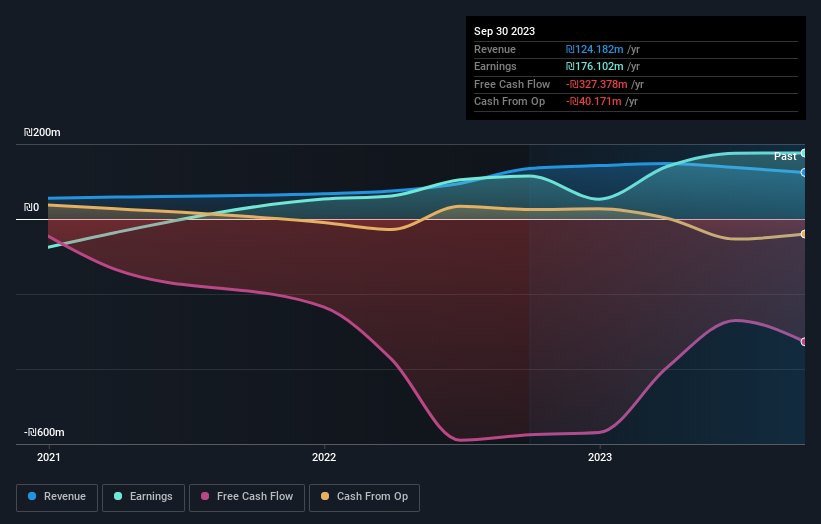Stock Analysis
- Israel
- /
- Construction
- /
- TASE:SBEN
Institutions profited after Shikun & Binui Energy Ltd's (TLV:SBEN) market cap rose ₪182m last week but public companies profited the most

Key Insights
- Shikun & Binui Energy's significant public companies ownership suggests that the key decisions are influenced by shareholders from the larger public
- Shikun & Binui Ltd. owns 71% of the company
- Institutions own 19% of Shikun & Binui Energy
Every investor in Shikun & Binui Energy Ltd (TLV:SBEN) should be aware of the most powerful shareholder groups. We can see that public companies own the lion's share in the company with 71% ownership. In other words, the group stands to gain the most (or lose the most) from their investment into the company.
While public companies were the group that reaped the most benefits after last week’s 7.4% price gain, institutions also received a 19% cut.
In the chart below, we zoom in on the different ownership groups of Shikun & Binui Energy.
See our latest analysis for Shikun & Binui Energy

What Does The Institutional Ownership Tell Us About Shikun & Binui Energy?
Many institutions measure their performance against an index that approximates the local market. So they usually pay more attention to companies that are included in major indices.
We can see that Shikun & Binui Energy does have institutional investors; and they hold a good portion of the company's stock. This suggests some credibility amongst professional investors. But we can't rely on that fact alone since institutions make bad investments sometimes, just like everyone does. It is not uncommon to see a big share price drop if two large institutional investors try to sell out of a stock at the same time. So it is worth checking the past earnings trajectory of Shikun & Binui Energy, (below). Of course, keep in mind that there are other factors to consider, too.

Shikun & Binui Energy is not owned by hedge funds. The company's largest shareholder is Shikun & Binui Ltd., with ownership of 71%. This essentially means that they have extensive influence, if not outright control, over the future of the corporation. Meanwhile, the second and third largest shareholders, hold 9.4% and 5.9%, of the shares outstanding, respectively.
Researching institutional ownership is a good way to gauge and filter a stock's expected performance. The same can be achieved by studying analyst sentiments. As far as we can tell there isn't analyst coverage of the company, so it is probably flying under the radar.
Insider Ownership Of Shikun & Binui Energy
While the precise definition of an insider can be subjective, almost everyone considers board members to be insiders. The company management answer to the board and the latter should represent the interests of shareholders. Notably, sometimes top-level managers are on the board themselves.
Insider ownership is positive when it signals leadership are thinking like the true owners of the company. However, high insider ownership can also give immense power to a small group within the company. This can be negative in some circumstances.
Our data cannot confirm that board members are holding shares personally. Not all jurisdictions have the same rules around disclosing insider ownership, and it is possible we have missed something, here. So you can click here learn more about the CEO.
General Public Ownership
With a 10% ownership, the general public, mostly comprising of individual investors, have some degree of sway over Shikun & Binui Energy. This size of ownership, while considerable, may not be enough to change company policy if the decision is not in sync with other large shareholders.
Public Company Ownership
Public companies currently own 71% of Shikun & Binui Energy stock. This may be a strategic interest and the two companies may have related business interests. It could be that they have de-merged. This holding is probably worth investigating further.
Next Steps:
It's always worth thinking about the different groups who own shares in a company. But to understand Shikun & Binui Energy better, we need to consider many other factors. Consider for instance, the ever-present spectre of investment risk. We've identified 1 warning sign with Shikun & Binui Energy , and understanding them should be part of your investment process.
Of course this may not be the best stock to buy. Therefore, you may wish to see our free collection of interesting prospects boasting favorable financials.
NB: Figures in this article are calculated using data from the last twelve months, which refer to the 12-month period ending on the last date of the month the financial statement is dated. This may not be consistent with full year annual report figures.
Valuation is complex, but we're helping make it simple.
Find out whether Shikun & Binui Energy is potentially over or undervalued by checking out our comprehensive analysis, which includes fair value estimates, risks and warnings, dividends, insider transactions and financial health.
View the Free AnalysisHave feedback on this article? Concerned about the content? Get in touch with us directly. Alternatively, email editorial-team (at) simplywallst.com.
This article by Simply Wall St is general in nature. We provide commentary based on historical data and analyst forecasts only using an unbiased methodology and our articles are not intended to be financial advice. It does not constitute a recommendation to buy or sell any stock, and does not take account of your objectives, or your financial situation. We aim to bring you long-term focused analysis driven by fundamental data. Note that our analysis may not factor in the latest price-sensitive company announcements or qualitative material. Simply Wall St has no position in any stocks mentioned.
About TASE:SBEN
Shikun & Binui Energy
Shikun & Binui Energy Ltd engages in the development, financing, construction, and operation of power generation plants based on solar energy, hydro, wind, and natural gas energies in Israel and internationally.
Solid track record and slightly overvalued.

